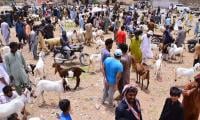ISLAMABAD/RAWALPINDI/PESHAWAR: The Taliban Friday shut down the Chaman-Spin Boldak border crossing saying no one would be allowed through until Islamabad abolished its visa requirements for Afghans.
In the wake of withdrawal of US and other foreign troops from Afghanistan, the Taliban captured the Chaman-Spin Boldak border crossing from the Afghan forces last month. The Taliban have blocked the road with concrete barriers on their side of the Friendship Gate.
In a statement on Friday, the Taliban asked Pakistan to scrap all visa requirements for Afghans. "(The crossing) will remain closed for all types of commuting, including transit and trade, for both sides, and pedestrians, until the Pakistani side leaves the gate open, morning to evening, for Afghans holding [Pakistani issued] migration cards or [Afghan] ID cards," shadow governor for Kandahar province said in a statement.
Taliban spokesman Zabihullah Mujahid said the group’s leadership had endorsed the move, and on Friday the border had been closed. Interior Minister Sheikh Rasheed Ahmad Friday confirmed the Taliban had shut the Chaman-Spin Boldak border crossing over Covid-19 certificate and biometric verification issues.
In a statement, he said the shadow governor of the Taliban had closed down the border after he refused to accept the conditions of biometric verification and COVID-19 certificate. Previously, Sheikh Rasheed said transit facility was provided to people to travel to and from the border after compliance with visa and biometric conditions.
“We have also shut down the Chaman-Spin Boldak border over the COVID-19 issues,” he said while confirming that the border had been shut down completely. Sheikh Rashid said Pakistan had no role in the internal matters of Afghanistan and the country would not let its soil be used against the war-torn neighbouring country.
In a related development, Prime Minister Imran Khan and Chief of the Army Staff (COAS) General Qamar Javed Bajwa visited the Peshawar Corps Headquarters on Friday. The prime minister laid a floral wreath at the Martyrs’ Monument and was briefed about the prevalent security situation, ongoing stabilisation operations, fencing along the Pak-Afghan Border and socio-economic development projects being undertaken in the newly merged districts of Khyber Pakhtunkhwa.
The prime minister was also briefed on various contingencies planned to tackle the evolving security situation along the Pak-Afghan border.
Imran expressed satisfaction over the efficacy of Pakistan’s comprehensive border management regime and the pragmatic measures being taken to ensure effective border control and internal security.
Imran Khan lauded the security forces for providing an enabling environment for completion of socio-economic development projects in the newly merged districts, which are vital for enduring stability and sustainable progress of the area.
The prime minister also appreciated the Corps Headquarters for its dedicated assistance to civil administration during the COVID-19, locust, anti-polio and tree plantation drives. Meanwhile, Foreign Minister Shah Mehmood Qureshi Friday once again underscored that a peaceful and stable Afghanistan is central to regional peace.
“Highlighting Pakistan’s positive contributions, he reaffirmed Pakistan’s steadfast support for an Afghan-led and Afghan-owned peace and reconciliation process.
Qureshi also underlined the importance of an inclusive, broad-based and comprehensive political settlement through the intra-Afghan negotiations,” said the Foreign Office in a statement.
Qureshi was participating in the 28th ASEAN Regional Forum (ARF) held online. The meeting was chaired by Brunei Darussalam and attended by foreign ministers and senior government officials of the ASEAN Regional Forum.
Pakistan announced that it will be co-hosting the 24th ARF Heads of Defence Universities/Colleges/Institutions Meeting with Malaysia in 2021. In his video remarks, Qureshi called for a concerted international effort to fight the COVID-19 pandemic and to develop a vaccine that is accessible to all as a global public good.
Pakistan remains opposed to any politicization of the issue. “Foreign Minister Qureshi also apprised the forum about the progress made by Pakistan in the field of counter-terrorism. He urged the ASEAN Regional Forum members to raise voice against the rise of “Islamophobia” and extremist tendencies in the region and around the globe,” added the Foreign Office.
Without naming India or IIOJ&K, the foreign minister condemned moves by states to alter the demographics of disputed territories under their illegal occupation and stressed the importance of a peaceful resolution of disputes according to the relevant UN Security Council resolutions.
On the issue of South China Sea, Qureshi reaffirmed Pakistan’s support for the ongoing negotiations of Code of Conduct and underlined that the parties concerned may find a solution through consensus.
Meanwhile, the Afghan Taliban Friday captured southern Nimroz province along with its provincial headquarters Zaranj, the first Afghan province to fall to Taliban since US forces withdrawal from Afghanistan.
The Taliban had recently changed strategy to start capturing provinces as until now their plan was to seize control of districts and rural areas. With the fall of Nimroz, Taliban claimed they had captured all border crossings with Iran.
"Except for Torkham in Nangarhar province with Pakistan and Hairathan in Balkh province with Uzbekistan, which are still in control of the Afghan government, the remaining border crossings are in our possession," a senior Taliban commander claimed.
Taliban commanders and their spokesman for southern Afghanistan Qari Yousaf Ahmadi told The News that their fighters had managed to seize control of Nimroz province without any significant resistance and casualties.
Qari Yousaf said they didn't suffer human losses adding they were not sure about casualties of the Afghan security forces as, according to him and other militant commanders, most of the Afghan officials and troops had left before the Taliban could enter the provincial headquarters, Zaranj.
"It is the first province that fell to us. It is a huge success and will definitely boost the morale of our fighters in other parts of the country," a Taliban commander said. According to the Taliban, they expected the Helmand province would get the title of the first province to fall to them, but it didn't happen due to some resistance from the Afghan security forces as well as heavy bombing by fighter jets on their positions.
A Taliban commander said they were in control of all important government buildings and installations including the governor's house, the police headquarters and an encampment near the Iranian border. Soon after capturing the governor's house, Taliban celebrated the victory and shared photos on the social media standing on the main entrance to the governor's house.
Taliban spokesman Zabihullah Mujahid said they had captured 204 districts across the country, but Zaranj was the first provincial capital to fall to them since the United States reached a deal with the Taliban in February 2020 for a US troop withdrawal.
According to Taliban sources, the shift in the strategy came recently when Mullah Yaqoob, chief of the powerful military council, convened a meeting of top military commanders and directed them to start their campaign for capturing provinces across the country.
"It was in the same meeting where Mullah Yaqoob approved major attacks, including car bombings on Afghan security forces and their installations even in urban areas but advised the commanders to take care of civilians.
Also, in the same meeting, he ordered his commanders to begin targeting US troops when and wherever they found them," one Taliban commander privy to the meeting said. He said the recent bombing allegedly by the US and Afghan forces in Helmand and civilian casualties had hurt Mullah Yaqoob to bring a change in strategy.
Mullah Yaqoob is the son of late Mullah Mohammad Omar Mujahid, the founder of Taliban movement, which they call Islamic Emirate of Afghanistan. He is stated to be close to Taliban supreme leader Maulvi Sheikh Haibatullah Akhunzada as he studied in his madrassa and reminded his student.
"Mullah Yaqoob is presently one of the few most powerful and influential figures in the Islamic Emirate of Afghanistan. He is head of the military commission, commander-in-chief of the Taliban military as well as deputy to the ameerul momineen Sheikh Haibatullah Akhunzada and can make important decisions," a Taliban leader close to Mullah Yaqoob told The News.
According to Taliban, seizing control of Zaranj is a major victory for them, saying Iran used to supply oil to Afghanistan via same route. They predicted that some other provinces would soon fall to them.
The Taliban Friday gunned down Dawa Khan Menapal, the director of Afghanistan's Government Media and Information Centre. Menapal's death is the latest killing of a government official just days after an assassination attempt on the country's acting defence minister.
Taliban spokesman Zabihullah Mujahid confirmed the killing to the international media. The assassination took place during the Friday prayers, according to the Interior Ministry's deputy spokesman, Said Hamid Rushan.
After the shooting, Afghan forces fanned out across the neighbourhood of Kabul where Menapal was gunned down while riding in his car. Mujahid later put out a statement claiming responsibility and said Menapal "was killed in a special attack."
Meanwhile, the UN special envoy for Afghanistan Friday questioned the Taliban's commitment to a political settlement, telling the UN Security Council the war had entered a "deadlier and more destructive phase" with more than 1,000 civilians killed in the past month during a Taliban offensive.
"A party that was genuinely committed to a negotiated settlement would not risk so many civilian casualties, because it would understand that the process of reconciliation will be more challenging, the more blood is shed," Deborah Lyons said.
"This is now a different kind of war, reminiscent of Syria, recently, or Sarajevo, in the not-so-distant past," Lyons said. "To attack urban areas is to knowingly inflict enormous harm and cause massive civilian casualties. Nonetheless, the threatening of large urban areas appears to be a strategic decision by the Taliban, who have accepted the likely carnage that will ensue," she said. She said the United Nations expected both irregular and legal migration numbers to double this year.
Peace talks between the Afghan government and Taliban negotiators started last year in the Qatari capital of Doha, but have not made any substantive progress.
Pakistan’s Representative to the United Nations, Munir Akram said that Islamabad did its best to resolve Afghan issue politically. He asserted that Pakistan is concerned over rapidly deteriorating situation in Afghanistan. He said that Pakistan would never allow its territory to be used against Afghanistan, adding that armed groups did not want to see peace in Afghanistan.
Russia's UN Ambassador Vassily Nebenzia told the council that the deteriorating situation in Afghanistan was of increasing concern and "with the withdrawal of foreign forces, the outlook looks grim."
"The prospects of Afghanistan slipping into full scale and protracted civil war, unfortunately, is a stark reality," Nebenzia said. Britain's UN Ambassador Barbara Woodward said the council "should leave the Taliban in no doubt that there will be consequences for them if they continue to pursue this military offensive" and pledged that Britain would not recognise a Taliban government that comes to power by force.
The UN Security Council has the ability to impose targeted sanctions on Taliban individuals or entities who constitute a threat to the peace, stability and security of Afghanistan. Senior US diplomat Jeffrey DeLaurentis urged the Taliban to halt its offensive, pursue a political settlement and protect Afghanistan's infrastructure and people.
"The Taliban must hear from the international community that we will not accept a military takeover of Afghanistan or a return of the Taliban's Islamic Emirate," he said.
Deputy Chinese UN Ambassador Dai Bing said foreign forces withdrawing from Afghanistan should be "more transparent with regional countries and avoid leaving behind all the problems and wash their hands of them."
"The US recently expressed its intention to assist Afghanistan in maintaining stability. We hope that the US can earnestly fulfill its commitment and step up efforts," Dai told the council. Afghanistan's UN Ambassador Ghulam Isazai urged the Security Council to act to "prevent a catastrophic situation."
He told reporters after the meeting that he was confident the Afghan army could withstand the Taliban offensive and that the country was not yet in a civil war.
"We have a six months security plan to stabilize the situation. And not only that, we have seen an outpouring of support from communities and villages that were recently attacked by the Taliban ... so we have a lot of interest among the population to support the army," he said.
Kasuri urged authorities of Pakistan and China to pull their resources to defeat forces seeking to disrupt the...
IHC said that several people had not returned the cipher copies they had, and asked if it meant it was right for the...
Gilani gave floor to Leader of Opposition Syed Shibli Faraz, who insisted that with unity they could take country...
Match witnessed intense action and dramatic twists, keeping fans on the edge of their seats until the final ball
Apex court bench was reconstituted after Justice Yahya Afridi recused himself from hearing the case earlier this month
ECP issued a notification in this connection pursuant to orders passed by LHC







